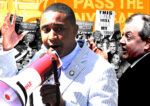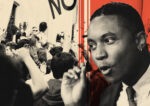A bill that would upend rental broker fees has been revised and is heading to a vote, and some feel the latest version is worse than the original.
In a video posted Wednesday, Council member Chi Ossé declared that his Fairness in Apartment Rental Expenses Act, or FARE, will pass on Nov. 13.
“Forced broker fees in New York City are dead in three weeks,” he says in a video posted to social media platform X. “I wrote this bill over a year ago, and I’ve been fighting with the real estate lobby ever since. They’ve had unlimited financial resources to fight against us.”
“But this is it, we’re going to win,” he added, saying “you’ll never have to pay a broker fee again.”
The office of Council Speaker Adrienne Adams, who determines whether a bill advances to a floor vote, would not confirm when or if Ossé’s measure will advance.
“The bill is still going through the legislative process, and as always, the Council continues to engage with stakeholders to accept public input,” said a spokesperson for the speaker.
A source familiar with discussions indicated that the speaker has made clear to stakeholders that she wants some form of the measure to pass. The bill has garnered support from 33 Council members, needing 26 to pass.
Ossé’s original bill stated that agents could only be paid by the person who hires them. A new version, shared with The Real Deal, clarifies what that means — and, critics say, puts nonexclusive listings in jeopardy.
The bill now defines an apartment’s listing agent as someone who enters into a compensation agreement with the landlord. It specifies that any agent who advertises a listing with the landlord’s permission cannot seek a fee from a tenant. In other words, brokers advertising a rental are considered to have been hired by the landlord.
One broker, speaking on the condition of anonymity, called the measure a “bait and switch” that does not reflect the reality of the market. Many owners do not work exclusively with one broker, but instead provide their listings to a number of agents who then try to find tenants.
A tenant who signs a lease then pays the broker a fee, often 15 percent of the annual rent. In some cases the owner will offer to pay the broker who finds a tenant.
Though the original bill did not contain this language, some agents feared this is where the measure was heading. BOND’s Doug Wagner has warned that nonexclusive listings would disappear from websites to avoid the appearance that a landlord had hired a specific broker.
The result, Wagner said, would be less transparency in the market and a “shadow inventory” of available but unadvertised apartments.
Sites like StreetEasy only require confirmation that a broker has permission from the landlord or property manager to advertise rental listings. Still, the site has thrown support to Ossé’s measure.
The latest version also establishes fines of up to $1,000 for a first violation of the bill’s payment protocol and up to $2,000 for each subsequent violation within two years.
The bill also requires landlords or agents to provide tenants with an itemized list of all fees that they are expected to pay. Failure to do so could result in a $500 fine, or $1,000 for repeat offenses. It also opens the door for tenants to file lawsuits against agents who don’t abide by the bill’s rules.
The Real Estate Board of New York, which has been fighting the bill, said the latest version will “make it much harder for tenants to rent apartments and [will] put the jobs of many brokers at risk.”
“The latest version of the FARE Act is yet another example of lawmakers making policy that will worsen the city’s housing crisis,” Jim Whelan, president of REBNY, said in a statement.
The group has argued that if the bill becomes law, landlords would not use a rental broker or would only show apartments to renters who bring their own, although the measure now also expressly forbids an owner from conditioning a lease on a tenant paying the broker.
Alternatively, according to the trade group, landlords will simply pass the cost of commissions onto tenants by increasing the rent. REBNY has said some tenants prefer to pay a broker fee rather than a higher initial rent because it’s cheaper over the long term. Ossé disagrees, saying free-market rents are determined each year by market economics, not by the base rent a tenant pays upon first leasing a unit.
“Under the FARE Act, landlords will pay the fee to brokers they choose to hire and tenants will pay the fee to brokers they choose to hire,” his office said in a statement. “The brokers providing important work to the rental market will continue to be hired and paid by the party who seeks their services. In the fair system established by this law, you get what you pay for and you pay for what you get.”
Passage of this measure would come after years of efforts by city and state lawmakers to restrict or do away with tenant-paid broker fees. Tenants typically pay 15 percent of their annual rent to brokers, adding to the thousands of dollars of costs associated with moving in the city.
Mayor Eric Adams has expressed concerns that the measure could hurt agents, but his sway with the Council likely took a hit when federal corruption charges were filed against him. The latest version of the bill could change before it goes to a vote.
Read more



